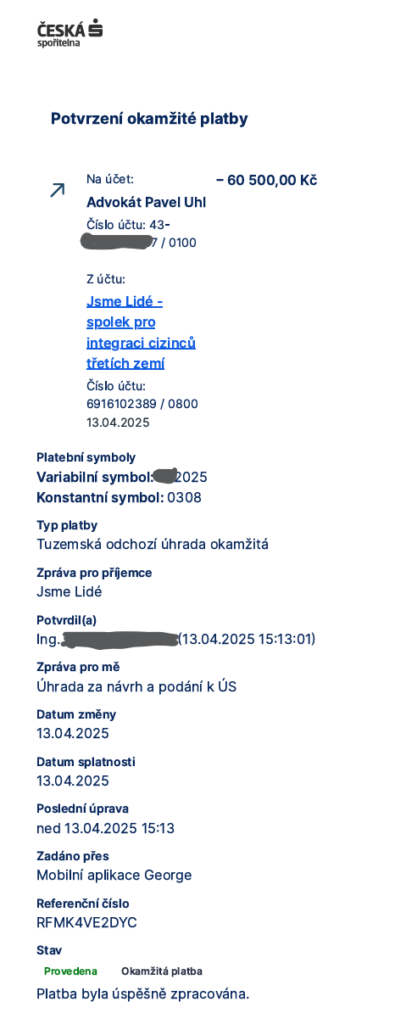We’re happy to share that our efforts have paid off!
The constitutional complaint seeking the annulment of Sections §7x and §7y of Act No. 65/2002 Lex Ukrajina 7 (stížnost) against the discriminatory amendment has been signed by 17 senators and submitted to the Constitutional Court.
See also: Information about the filed lawsuit on the website of the Constitutional Court
But that’s not the only good news!
As of April 11, 2025, our association Jsme Lidé finally has an official bank account.
You can now send donations to help cover our legal costs.
The required initial amount — CZK 60500 — is for drafting and submitting the complaint to the Constitutional Court.
Updated on 13.04.2025: In less than half an hour after we started the collection, we have raised the required amount and even more – so far we have received 79900 kroner, which is enough to cover the costs of the first phase! Thank you very much!
Confirmation of payment to the lawyer

We did it — together!
Let us now tell you the full story
As you know, when a “rider” was added to the Lex Ukrajina 7 law — a provision that prohibits Russian citizens from acquiring Czech citizenship — we did not give up.
For six and a half months, our self-organized community Jsme Lidé, through its activists and supporters, worked tirelessly:
- engaging with the media,
- talking to politicians,
- recording motivational videos,
- writing analytical texts,
- building up our social media presence to explain to Czech society that our minority also deserves to become Czech citizens.
Our petition was read in the Parliament of the Czech Republic and our representatives were invited to speak at a meeting of the Human Rights Committee of the Senate of the Czech Republic, on the basis of which the committee unanimously recommended that the Senate should not approve the amendment.
And when that didn’t work — and the rider was passed — we started traveling across the country, meeting senators, explaining the problems with the amendment, and asking them to support a constitutional complaint.
People truly dedicated themselves to this cause, putting everything else on hold.
Eventually, we gathered the required number of preliminary endorsements.
Then we focused on choosing a constitutional lawyer — and hired one of the best in the Czech Republic: Pavel Uhl, who agreed to take on our case.
In March, the draft of the complaint was completed.
Since senators are the formal applicants, they had the final say on all decisions.
There were disagreements over the wording, but in the end, we managed to find formulations that everyone could agree on.
Key arguments in the constitutional complaint:
- Paragraphs §7x and §7y of the amendment violate the principle of equality by discriminating against Russian citizens in the process of acquiring Czech citizenship.
- The conditions set by the law make it practically impossible for Russians to acquire Czech citizenship, which contradicts the principles of a democratic legal state.
- Making Czech citizenship dependent on the consent of Russian authorities undermines the sovereignty of the Czech Republic.
- The regulation is illogical and ineffective — it does not achieve the stated goal of enhancing security and may even backfire.
- The amendment violates the Czech Republic’s international obligations, including the European Convention on Nationality.
- Terminating all current and future naturalization procedures for Russian citizens violates legal predictability and the right to due process.
- The law breaches the principle of separation of powers, as the executive branch effectively loses its ability to decide on granting citizenship freely.
- The European Court of Human Rights has recognized that renouncing Russian citizenship is extremely difficult in practice, making the amendment’s requirement unrealistic.
- The Court was also asked to evaluate whether the amendment qualifies as a so-called “rider” (přílepek), and whether its adoption violated procedural rules.
- This issue sparked significant debate among the senators, as not all of those who consider the amendment discriminatory agree that it constitutes a rider.
On April 9 all the all 17 signatures of senators required for submission were successfully gathered.
After it Pavel Uhl submitted the document to the Constitutional Court.
The invoice from our lawyer for writing the complaint totals CZK 60500, and we need to pay it by May 14.
So we kindly ask for your support in covering this and future legal expenses
account: 6916102389/0800
variable symbol: 1001
message for recipient: "finanční dar"

Updated on 13.04.2025: In less than half an hour after we started the collection, we have raised the required amount and even more – so far we have received 79900 kroner, which is enough to cover the costs of the first phase! Thank you very much!
Once submitted, the complaint usually appears on the Constitutional Court’s website with a delay of 1–2 months.
The Court will assign a judge to the case, after which the complaint will be sent to the Ombudsman, government, and both chambers of Parliament for comments.
Then, the judges may either rule on the matter in a closed session, or hold a public hearing — with representatives of the government, the lawyer, the Ombudsman, and others present.
Expected timeframe for the case: 1–2 years.
Let’s remember: a 100% guaranteed outcome in court does not exist.
But our lawyer is fairly optimistic.
And we ourselves still have some strategic options we can pursue to increase our chances — we’ll share those later.
We are deeply grateful to everyone who has done and continues to do such important work on this path.
To everyone who supported us at any stage — and even those who felt discouraged and stepped away.
Your contribution matters.
It’s important to understand: each of us is just an ordinary person who had never done anything like this before.
We had no connections in the Czech government.
Most of us work in fields completely unrelated to law or human rights.
And yet — we made it this far through teamwork!
In March, we officially registered our association for collecting money on lawyer’s services to file a claim to cancel the amendment in Constitutional court and to help the individuals who suffer from it:
“Spolek pro integraci a dialog“
This ensures transparent and official communication with our lawyer and state institutions.
We’d love it if you continued to support us — with kind words and donations.
There’s still so much ahead!